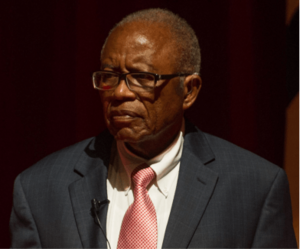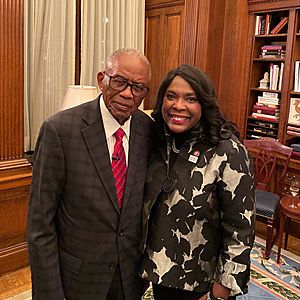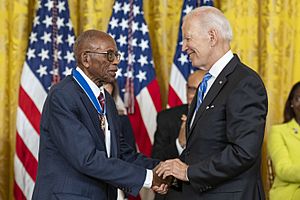Fred Gray (attorney) facts for kids
Quick facts for kids
Fred Gray
|
|
|---|---|

Gray speaking at Emporia State University on September 15, 2016
|
|
| Member of the Alabama House of Representatives | |
| In office 1971–1974 |
|
| Personal details | |
| Born |
Fred David Gray
December 14, 1930 Montgomery, Alabama, U.S. |
| Spouse |
Bernice Hill
(m. 1955) |
| Children | 4 |
| Alma mater | Alabama State College (BA) Case Western Reserve University (JD) |
| Occupation | Lawyer |
| Awards | |
Fred David Gray (born December 14, 1930) is an American lawyer, preacher, and activist. He played a huge role in the Civil Rights Movement in the United States. He helped fight for equal rights for African Americans through many important court cases. Gray also served as a state legislator in Alabama. He was one of the first Black state lawmakers in Alabama in the 20th century.
Contents
Early Life and Education
Fred Gray was born in Montgomery, Alabama. He went to Loveless School for his early education. Later, he attended the Nashville Christian Institute, a boarding school. There, he helped a famous preacher named Marshall Keeble visit different churches.
After finishing high school, Gray went to Alabama State College for Negroes. He earned his bachelor's degree in 1951. Even though he first planned to be a historian and preacher, a teacher encouraged him to study law. Gray then moved to Cleveland, Ohio, and earned his law degree from Case Western Reserve University School of Law in 1954. At that time, Black students were not allowed in law schools in Alabama.
After passing his law exam, Gray returned to Montgomery and opened his own law office. He also started preaching at the Holt Street Church of Christ, where his parents were members.
A Career as a Preacher
In 1957, Fred Gray became a preacher in the Churches of Christ, fulfilling his mother's wish. He later helped bring together white and Black church groups in Tuskegee, Alabama, where he had moved. Gray also served on the board of trustees for Southwestern Christian College, a college for Black students in Texas. In 2012, Lipscomb University gave Gray an honorary doctorate degree. This was special because Gray had once challenged the university's rules about segregation.
Fighting for Civil Rights
During the Civil Rights Movement, Fred Gray became well-known for working with leaders like Martin Luther King Jr. and E.D. Nixon. As a young lawyer, some of his first cases involved defending Claudette Colvin and later Rosa Parks. Both were arrested for refusing to give up their seats on segregated city buses.
When the NAACP (National Association for the Advancement of Colored People) was stopped from operating in Alabama in 1956, Gray worked for eight years to get them back. He won their right to operate again after many court battles. He also successfully defended Martin Luther King Jr. in a tax evasion case in 1960. Gray won an acquittal from an all-white jury, which was a big achievement.
Key Court Cases for Equality
Fred Gray took on many other important civil rights cases:
- Dixon v. Alabama (1961): This case helped establish that students at public universities have rights to fair treatment.
- Gomillion v. Lightfoot (1962): This case overturned a plan that tried to exclude most Black residents from voting in Tuskegee. It helped lay the groundwork for the idea of "one person, one vote."
- Williams v. Wallace (1963): This case protected the rights of people participating in the Selma to Montgomery marches.
Gray also worked hard to make sure the NAACP could organize in Alabama after it was banned.
Desegregating Schools and Universities
After the U.S. Supreme Court ruled in Brown v. Board of Education (1954) that segregated public schools were illegal, Alabama resisted. Gray successfully represented Vivian Malone and James Hood. They were denied entry to the University of Alabama. They were able to enter the university despite Governor George Wallace's famous "Stand in the Schoolhouse Door" protest.
In 1963, Gray successfully sued Florence State University (now University of North Alabama) on behalf of Wendell Wilkie Gunn, who was denied admission because of his race. Gray also led the successful effort to desegregate Auburn University.
In 1963, Gray filed the Lee v. Macon County Board of Education case. This case led to a court order in 1967 for all Alabama public schools to desegregate. Lawsuits filed by Gray helped desegregate over 100 local school systems. They also helped desegregate all public colleges and universities in Alabama.

Entering Politics
In 1970, Fred Gray and Thomas J. Reed became the first African Americans elected as lawmakers in Alabama since the Reconstruction Era. Gray's district included Tuskegee and parts of other counties.
Gray's autobiography, Bus Ride to Justice, was first published in 1994. A new edition came out in 2012. In December 2024, a portrait of Fred Gray was unveiled at the National Portrait Gallery in Washington, D.C. It is now part of the gallery's permanent collection.
Browder v. Gayle Case
Browder v. Gayle was a very important court case. It challenged the laws in Montgomery and Alabama that made buses segregated. On June 5, 1956, a special court ruled that bus segregation was against the U.S. Constitution. This ruling was based on the Fourteenth Amendment, which says everyone should be treated equally.
The state and city tried to appeal this decision, but the U.S. Supreme Court upheld the ruling on November 13, 1956. This meant bus segregation was officially illegal.
This case started after the Montgomery Bus Boycott began in December 1955. Civil rights leaders decided to file a federal lawsuit. About two months into the boycott, activists looked at the case of Claudette Colvin. She was a 15-year-old who had been arrested for refusing to give up her seat on a Montgomery bus, even before Rosa Parks.
Fred Gray, E. D. Nixon, and Clifford Durr searched for the best legal way to challenge the bus segregation laws. Gray did a lot of research and talked with other lawyers, including Thurgood Marshall, who later became a Supreme Court Justice. Gray then approached Claudette Colvin, Aurelia Browder, Susie McDonald, and Mary Louise Smith (activist). These women had all faced unfair treatment on the buses. They agreed to be plaintiffs (people who bring a lawsuit) in the federal case. This allowed them to bypass the Alabama state court system.
Tuskegee Study Lawsuit
Fred Gray also represented people in a major lawsuit about the "Tuskegee Study." This was a controversial study that took place from 1932 to 1972. During the study, rural African-American men with a serious illness were not given proper medical treatment, even though they thought they were receiving free healthcare.
Gray filed the lawsuit, Pollard v. U.S. Public Health Service, in 1972. This happened after someone revealed the problems with the study to newspapers. In 1975, Gray successfully reached a settlement for $10 million. The people who were still alive from the study also received medical treatment. As a result of this lawsuit, new federal laws were created to protect people involved in medical research. These laws made sure that studies are done ethically and that people's rights are protected.
In 1997, Gray founded the Tuskegee History Center. This center has a museum and offers educational resources about the Tuskegee Study. It also highlights the contributions of different groups to human and civil rights.
Personal Life and Awards
Fred Gray married Bernice Hill, who was his secretary, in 1955. They had four children. He published his autobiography, Bus Ride to Justice: The Life and Works of Fred Gray.
Fred Gray has received many awards for his important work:
- In 1980, the Southern Christian Leadership Conference gave him its Drum Major Award.
- The American Bar Association honored him with the Spirit of Excellence Award in 1996.
- In 2002, Gray became the first African-American president of the Alabama Bar Association.
- In 2006, the NAACP recognized his achievements with the William Robert Ming Advocacy Award.
- In 2021, his hometown of Montgomery renamed the street he grew up on after him.
- In 2022, the University of Alabama School of Law and Princeton University gave Gray honorary doctorates.
- On July 7, 2022, President Joe Biden presented Gray with the Presidential Medal of Freedom. This is one of the highest civilian honors in the United States.
 | James B. Knighten |
 | Azellia White |
 | Willa Brown |


